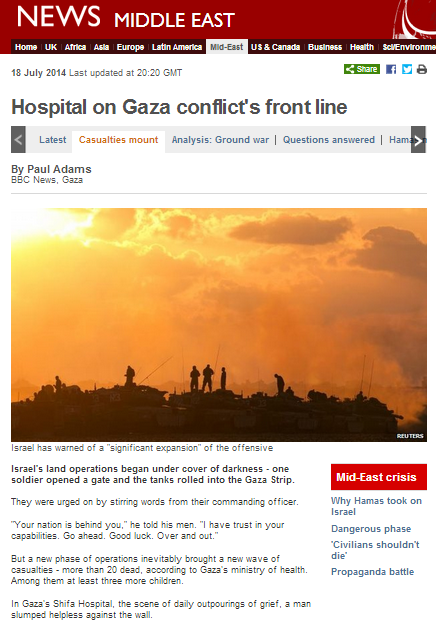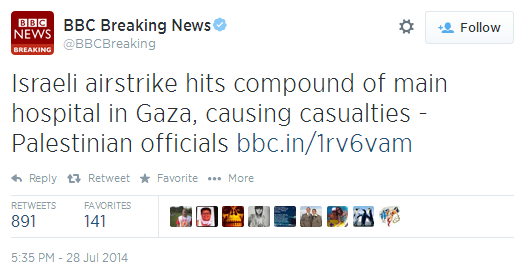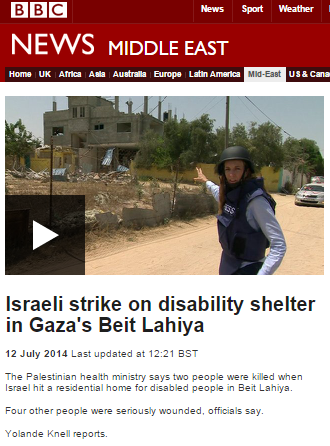On July 31st the Associated Press reported an airstrike (allegedly not the first) on a hospital in the Dara’a province of southern Syria.
“In southern Syria, an airstrike on a hospital in an opposition-controlled town put the facility out of service Sunday.
The hospital in Jasem was targeted in one of several airstrikes to hit the town in Deraa province, located some 35 miles (57 kilometers) south of Damascus, according to the Local Coordination Committees activist network. The group said six people were killed in the strikes, blaming them on the government.
The Syrian Observatory for Human Rights monitoring group said the hospital strike killed a pharmacist and put the facility out of service.
In a statement later Sunday, the president of the International Rescue Committee, David Miliband, said the group was “dismayed” and “angry” at the attack on the hospital, which it was supporting. It said six people had been killed in the strike, and many more wounded. It said that across Syria “aid workers and civilians are being targeted in a merciless way on a daily basis,” and called for all those involved to be held to account.
Hospitals are regularly targeted in Syria’s war, drawing condemnation from the U.N. and the international community. The New York-based Physicians for Human Rights says over 90 percent of attacks on medical facilities in Syria have been carried out by pro-government forces.”
While the BBC News website has not yet reported that attack, it did publish cautiously worded written and filmed reports on an attack on another hospital in the Idlib province the previous day.
“It’s not yet known who was responsible for the attack…”
“These unverified pictures…”
“Amnesty International say the latest bombing appears to be part of what they describe as a despicable pattern of attacks in Syria deliberately targeting medical facilities.”
The BBC has also covered previous attacks on medical facilities in Syria, including in Aleppo in June and in April. In an article from February 2016 titled “Syria crisis: Air strikes on hospitals ‘war crimes’“, the BBC News website took the trouble to provide audiences with a short guide to the legal background to the topic.

So as we see, the BBC is aware of the fact that medical facilities can be a legitimate military target in certain situations but notably, it did not go to the trouble of informing its audiences of that fact two years ago during the conflict between Israel and Hamas. Moreover, the corporation went out of its way at the time to conceal Hamas’ use of hospitals in the Gaza Strip for military purposes and to provide amplification for denial of that tactic, thereby implying that Israeli actions were unnecessary, unjustified and even unlawful. For example:
“Hospital on Gaza conflict’s front line” by Paul Adams, BBC News website, July 18th 2014 – discussed here.
“Israel says rockets have been fired from Basman al-Ashi’s hospital, a charge his staff deny completely.”
“World Update” interview with ISM activist, BBC World Service radio, July 31st 2014 – discussed here.
Damon: “Because you will know that there have been all kinds of rumours on the internet about hospitals being used to hide men and indeed weapons. Any evidence?”
Catron: “Oh yes; I’ve heard all these…all kinds of these rumours. I’ve seen numerous claims that al Wafa hospital where I stayed for a week in Shuja’iya was the centre of a Hamas and Islamic Jihad militant command centre. Now every journalist that came into the hospital from every major news agency had full run of the place. They could go anywhere in it they liked. How none of them ever noticed this command centre….”
“Gaza conflict: Contrasting views on targeting” BBC News website, August 4th 2014 – discussed here.
“The Israelis say they have to bomb the hospitals and shelters because there are fighters here, but that is not true. The only people we have are sick people.”
The BBC also amplified the false notion that Israel indiscriminately and unjustifiable targeted medical facilities – for example:
“Gaza crisis: Israel releases ‘aborted airstrike’ video” by Orla Guerin, BBC News website, July 31st 2014 – discussed here.
“This is a crowded area. People have nowhere to go. In many cases they have no transport, they have no means of escape. And you’re attacking hospitals where the wounded are being treated.”
“Gaza ceasefire ends as Israel reports rocket fire” and “Israel air strikes resume in Gaza amid rockets” BBC News website, August 8th 2014 – discussed here.
“On Thursday, the human rights group Amnesty International called for an investigation into what it said was mounting evidence that Israeli forces had deliberately attacked hospitals and health professionals in Gaza. The attacks have left at least six medics dead.”
It has continued to promote that falsehood since the conflict ended – for example here – and also to broadcast additional denial of Hamas’ use of hospitals for military purposes.
So as we see in Syria, where there is cause to believe that medical facilities really are being attacked indiscriminately, the BBC uses very cautious wording and informs its audiences of the legal background to the issue. In contrast, in its reporting from the Gaza Strip in 2014, the BBC failed to provide any such background information, repeatedly promoted the theme of Israeli wrongdoing and actively misled its audiences with regard to the reason for Israeli actions against institutions such as Wafa hospital: Hamas’ use of that medical facility for military purposes.
Related Articles:
BBC claims that Israel targeted a centre for the disabled in Gaza shown to be inaccurate
Clarifications required for BBC reports on Shati incident
BBC reports on Wafa hospital shown to be inaccurate
Revisiting BBC reporting of civilian deaths in Gaza on July 28th 2014




